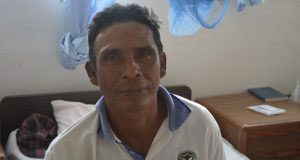GUYANA, through years of diligent work has been able to stifle the growth of malaria, a mosquito-borne disease that has claimed the lives of millions in the tropical and sub-tropical regions of the planet.Malaria is a life-threatening disease caused by parasites that are transmitted to people through the bites of infected female Anopheles mosquitoes.

Malaria symptoms occur at least seven to nine days after one is bitten by an infected mosquito and include fever, chills, sweating, headache, body aches, nausea, vomiting and fatigue.
Malaria may also cause anaemia and jaundice. Importantly, the plasmodium falciparum infection if not promptly treated, may cause kidney failure, coma and even death.
“I had never felt like this before. I wasn’t just sick with fever and a headache, I felt detached from myself. I was on a stretcher in the interior and I felt I couldn’t breathe, it was like dying,” Mark Scott, a malaria patient at the Georgetown Public Hospital told the Guyana Chronicle.
This publication was unable to obtain recent comparative statistics on malaria, but those in the public domain show a positive sign in the fight against the disease.
Guyana has managed to reduce the prevalence of malaria from 5,084 per 100,000 persons in 2005 to 1,541 per 100,000 persons in 2008.
And according to reports, there has been no increase in reported cases in recent years. These improvements can be attributed to the success of prevention efforts, as well as to the detection and treatment of contracted cases.
Guyana has been working to ensure improvement in compliance with treatment and overcoming the logistical difficulties associated with detection, treatment and monitoring of interventions.
These efforts will intensify in 2017, with strong focus in the hinterland region, which has a population of some 112,000.
MIGRATION
With a change in climate, where the environment is getting hotter, the mosquitoes have been migrating farther within the hinterland regions where the atmosphere is cool and conducive to their growth.
If their presence close to human settlements is not addressed, it can become not only a nuisance, but also a menace to residents.
Michael Boyet, 52, a resident of the Pomeroon, related that he became infected with malaria a year ago, while working at a gold mine in Region One.
He was initially treated at the Port Kaituma Hospital, but was referred to the Charity Hospital.
According to the father of six, he got infected because, in his mining camp, there were no treated nets and the environment was very unclean.
Several other miners at his camp, he said, were infected by the disease. According to him, infection in mining areas can be kept to a minimum if regional health officials pay regular visits to mining camps.
Head of the Vector Control Unit, Dr Horace Cox, told the Guyana Chronicle that beginning from early next year, the Vector Control Unit will have a heightened presence in the hinterland regions.
DISTRIBUTION OF TREATED NETS
Some 80 per cent of the hinterland population, including miners and loggers, will receive long-lasting insecticide-treated nets (LLINs).
In addition, “in vivo” tests will be done to ascertain the mosquito’s resistance to anti-malarial drugs.
The in vivo test consists of the treatment of a group of symptomatic and parasitaemic individuals with known doses of anti-malarial drugs and subsequent monitoring of the parasitological and clinical response over time.
One of the key characteristics of in vivo tests is the interplay between host and parasite, Dr Cox said, pointing out that diminished therapeutic efficacy of a drug can be masked by immune clearance of parasites among patients with a high degree of acquired immunity.
Resistance to anti-malarial drugs has been noted for two of the four species of malaria parasite that naturally infect humans: falciparum and vivax.
The vector control chief also said that next year, a new entomology unit will be established at Diamond, East Bank Demerara, with funding from the Inter-American Development Bank (IDB).
That unit will carry out tests on mosquitoes and their resistance to drugs used for treatment.
This aside, miners and loggers will benefit from “Care Start Rapid Test” whereby results from malaria tests will be available in 20 minutes, and attention will also be placed on the coastland.

Fogging, Dr Cox said, will be carried out in these communities.
He explained that though fogging kills adult mosquitoes, the chemical used has no effect on the larvae and pupae stages of mosquitos.
Therefore, instead of an area being fogged once, it will be fogged twice. Once this process is correctly done, it can trigger a 60 per cent decrease in the mosquito population, Dr Cox said.
According to doctors at the Georgetown Public Hospital, plasmodium falciparum, the most prevalent form of malaria, accounts for more than 50 per cent of the malaria cases in Guyana.
Malaria and other mosquito-borne diseases can be prevented if persons can avoid getting bitten by mosquitoes. And to do this, they can take simple precautions such as dressing in long-sleeves and long pants when outside and for extra protection, they can spray thin clothing with repellent.
They can also clear containers with stagnant water in their yards and neighbourhoods, since it is in these environments that mosquitoes breed. In this way, Guyana can continue to have the upper hand in the fight against malaria.













1 thought on “Subduing malaria — Guyana building resistance against infected mosquitoes”
Covering up those open sewers would help to and. Make it more visitor friendly.